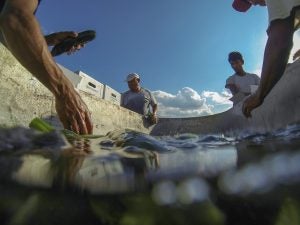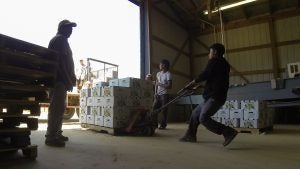[Myth] Dateline, South Park, Colorado: Hordes of undocumented immigrants (from the future!) descend on the podunk town of South Park, in a frantic search for jobs. In retaliation, the townsfolk go to outrageous lengths to stop this menace.
[Reality] Dateline, Everytown, USA: Due to an acute ag labor shortage, crops go unharvested and rot in the field. Farmers sit idly by, powerless to stop it. Their desperate attempts to jumpstart guestworker program reforms go unheeded. More foot dragging as usual by policymakers.
I have to confess — I’m partial to the comedy stylings of Trey Parker and Matt Stone. South Park is my go-to resource when it comes to social commentary, and the immigration/guestworker debate is no exception. Only that brilliant duo could craft a story so utterly irreverent and contemporary, while using time travel as an allegory for geographic migration trends. It’s a perfect take on the absurdity surrounding the issue.
And that absurdity is 100 percent manufactured by critics, the self-styled guardians of all things ostensibly American. It’s a standard laundry list: Immigrants dilute our national identity. Immigrants depress wages. Immigrants don’t want to assimilate. Lock those borders and throw away the key.
And while there’s no shortage of critics, there is an undeniable shortage of native-born Americans willing to do manual labor, particularly farmwork. A running joke in the South Park universe is “dey took er jobs!” But is this legit? I don’t see “natives” lining up for coveted farming jobs.
That’s one side. Another camp is in favor of liberalized immigration. There’s just one hitch, they see the 1960 exposé “Harvest of Shame” (by vaunted journalist Edward R. Murrow) as undeniable proof that our industry thrives on exploitation. And while there are always a few bad apples, most farmers bristle at the suggestion. It’s not like the farmer is lounging at Club Med, sipping on piña coladas — all while keeping a lazy eye on his/her phone as the crew is toiling in the field. We work side by side.

Indeed, the armchair pundits (on both sides) aren’t responsible for farmer livelihoods, or our national food security. What’s the solution then? Guestworker reform would be the first on the agenda. The H2A program brings foreign workers stateside for the growing season. The paperwork is cumbersome and expensive — and, for some inexplicable reason, participating farms have to advertise the position locally to give natives first dibs!
Get real. In the nearly 30 years that I’ve worked at the family farm, I can remember one native-born Anglo come off the street asking for a job. He sputtered out after half a day. In the past 80+ years, my family has seen different “waves” of immigrant labor, from Germans and Slavs, to Puerto Ricans, and finally Mexicans and Guatemalans. And while the face of the workforce is always in flux, the migrant ethic is constant: they are unquestionably driven and reliable.
But more than that, they’re comrades-in-arms. I fondly remember working alongside Puerto Ricans as a tween. This was my first exposure to another culture in an otherwise very insular upbringing. It certainly made me worldlier — in academia we call it “cultural competence” — and it gave me a real-life platform to hone my still atrocious Spanish. Like any team, everyone had their own quirks. All of the gringos were given nicknames that matched our personas and/or appearance. I was cabezón — literally the big-headed/stubborn guy. No disagreement there. The next wave of migrants were Mexicans. Apparently I am now el gorilla, due to my voracious eating habits at break time. No translation needed!
And despite any cultural differences, some shared culture is assured in this increasingly globalized world. Heck, a number of years ago, most of the crew and I went to a WWE wrasslin’ event in a rented limo.
I think it’s evident that immigrants (both permanent and temporary) have been a positive engine of economic and social growth. They are forever woven in the historical tapestry of this country. It’s a vocational symbiosis. Note to policymakers: Streamline the process so both parties can benefit!
Immigrants are as much the embodiment of American exceptionalism as any “native born”, ironically, perhaps even more so. As a show of solidarity, we’d be wise to (re)learn those ideals from them.
Tim Durham’s family operates Deer Run Farm — a truck (vegetable) farm on Long Island, New York. As an agvocate, he counters heated rhetoric with sensible facts. Tim has a degree in plant medicine and is an Assistant Professor at Ferrum College in Virginia.




